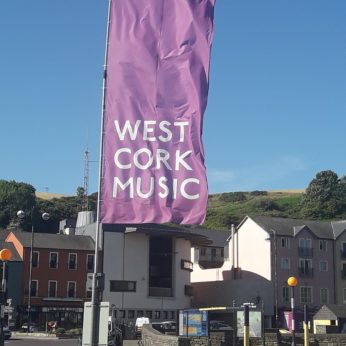Composer: Rebecca Clarke (b. 1886 - d. 1979)
Performance date: 07/07/2018
Venue: Bantry Library
Composition Year: 1921
Duration: 00:21:44
Recording Engineer: Tom Norton, RTÉ
Instrumentation: vc, pf
Instrumentation Category:Trio
Artists:
Ella van Poucke -
[cello]
Nathalia Milstein -
[piano]
Andreas Reiner -
[violin]

Andreas Reiner [violin], Ella van Poucke [cello], Nathalia Milstein [piano]
Rebecca Clarke [1886-1979]
Piano Trio [1921]
1. Moderato ma appassionato
2. Andante molto semplice
3. Allegro vigoroso
Rebecca Clarke was a pioneering female musician and composer in the first half of the twentieth century, a time of serious prejudice against women composers and, indeed, women musicians. She had a harrowing childhood with a tyrannical and abusive American father (we were all of us whipped, sometimes really painfully), who disapproved of her compositional ambitions but nonetheless allowed her to study at the Royal Academy of Music in London. The story goes that, when her harmony professor proposed to her, her father insisted she leave. Two years later she enrolled in the competing Royal College of Music where she became the first female composition student of Charles Stanford, the Irish-born composer and long-standing professor of composition. It was Stanford who persuaded her to take up the viola with Lionel Tertis as her teacher. She was again unable to finish her studies as her father banished her from the family home because she kept criticising him for his extra-marital liaison.
After that she made her living as a freelance violist and in 1912 she was invited by Sir Henry Wood to join the Queen’s Hall Orchestra, previously an all-male ensemble. She was also an active chamber musician, often with the renowned cellist May Mukle with whom she formed the all-women English Ensemble. Her two most famous works (and seemingly her only multi-movement works), the Viola Sonata and the Piano Trio, were composed during her time in USA as competition entries sponsored by the famous Elizabeth Sprague Coolidge, who had encouraged her to enter. Her career as a composer – in contrast to her career as a chamber musician – was eventually overwhelmed by a combination of the difficulty of getting her works published and her own self-effacing modesty.
Like her Viola Sonata, the Trio opens with a great shout, the piano’s fortissimo announcement of the motto theme as if saying – here I am, listen to me. This theme in its many moods and articulations links together the three movements. The second subject, marked mysterioso, is in sharp contrast. The long development is based mainly on the motto theme, but incorporates the mysterioso theme at climactic moments. There is a striking coda that begins with a slow version of the motto theme in canon.
The strings are muted for the Andante and echoes of the motto theme can be heard. The second theme is a lovely folk-like melody in the piano over a consoling string accompaniment. The music briefly threatens to work up a climax but instead gradually fades away. The final Allegro vigorosa takes the opposing view although a quieter episode recalls the Andante, it is soon aggressively brushed aside. The motto theme in its original triumphant version returns one last time before being taken up slow and elegiac in a prequel to the animated coda.
Francis Humphrys
Copyright © 2024 West Cork Music. All rights reserved.
Designed and developed by Matrix Internet